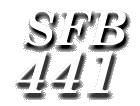
Project B14:
Discourse traditions of romance languages and multidimensional analysis of diachronic corpora
|
||
|
||
|
||
|
||
|
||
|
Project leader
|
Prof. Dr. Johannes Kabatek Romanisches Seminar Universität Tübingen Wilhelmstr. 50 D-72074 Tübingen |
|
Phone: +49/7071/2972395 Fax: +49/7071/295859 E-Mail: kabatek@uni-tuebingen.de |
Staff
Project members:
|
Philipp Obrist SFB 441 Universität Tübingen Nauklerstr. 35/3.03 D - 72074 Tübingen Phone.: 07071 / 2977159 E-Mail: philipp.obrist@uni-tuebingen.de Homepage: homepages.uni-tuebingen.de/philipp.obrist |
Valentina Vincis Romanisches Seminar Universität Tübingen Wilhelmstr. 50 D - 72074 Tübingen Phone.: 07071 / 2974293 E-Mail: valentina.vincis@uni-tuebingen.de Homepage: http://www.romanistik.uni-tuebingen.de/?q=user/66 |
Aims
Detailed grant proposal (in german) (.pdf)
Project summary
This project aims to bring together two different methodologies of text analysis: philologically based research on so called "discourse traditions", which have been intensively discussed particularly in Romance linguistics over the past few years, on the one hand; and more formalized, quantitative approaches to text variation as used in corpus linguistics, on the other. Research on discourse traditions inherits the philological method of qualitative analysis and accounts for a large amount of factors - often individually defined for each text - which include elements of content, formal textual elements as well as linguistic features. In opposition, corpus linguistics-orientated approaches seek to quantify "multi dimensional" textual and linguistic factors (such as tense/ aspect, adverbs, pronouns, noun forms, subordination/ coordination, type-token relations etc.) in order to create a systematical ground for the comparison of different types of texts. As an example, cf. the synchronic and diachronic contributions by Douglas Biber on English and other languages. In our own preceding research, Raible's (1992; 2001) clause linking model and its "junction techniques" have proved to be the basis for an efficient tool for text classification. In contrast to Biber's multi dimensional analysis, this model focuses on a series of particular features, half way between text and clause, which seems particularly characteristic for analysis in terms of discourse traditions. Both detailed philological and symptomatical text analysis strive to find particular patterns determined by textual traditions, but an analysis reduced to symptomatic elements allows to scan and compare larger amounts of texts. This analysis is particularly important for diachronic linguistics: it might point to differentiated explications of what superficially seem to be evolution processes of a homogeneous linguistic system. A method that allows to explain textual differences in the use of "conservative" and "innovative" elements is therefore an important and not yet available tool for diachronic research in Romance linguistics.
Cooperations
Within the SFB:
- B6 : lexical motivation, type-token relation
- B11 : clause linking in Ladakhi
- B13 : information structure and clause linking
- B15 : phonological and syntactical research on clause linking
With other projects:
- Corpus digitalizado de textos bíblicos en español antiguo, Universitat de les Illes Balears (project leader: Prof. Dr. Andrés Enrique-Arias)
- Para a história do português brasileiro, Universidade de São Paulo (project leader: Prof. Dr. Ataliba Teixeira de Castilho)
- Dr. Mónica Castillo Lluch, Université de Paris VIII/ Vincennes
- Dr. Lola Pons Rodríguez, Universidad de Sevilla
Selected workshops and invited talks
- 8-10 December, 2005: International Workshop: Del Cid al Quijote: tradiciones discursivas, lingüistica de corpus y sintaxis histórica.
- 16 November 2006: Invited talk by Douglas Biber (University of Northern Arizona): Spoken and written register variation in Spanish: A multi-dimensional analysis.
- 19 May 2008: Invited talk by Mark Davies (Brigham Young University): From the 'Corpus del español' to the 'Corpus do português': Evolving architectures for historical corpora.
- 13 June 2008: International Workshop: Variación sintáctica del español. Historias - estructuras - normatividad.
- 19 November 2009: Invited talk by Bernd Kortmann (Universität Freiburg i.Br.:): The complexity of grammars: From the study of large-scale variation in English to language typology.
- 16 November 2009: Invited talk by José María García Martín (Cádiz/Heidelberg): Transformaciones sintácticas del castellano medieval al español clásico.
Page created by Christoph Malisi and Philipp Obrist. Last update: 07/07/2009

